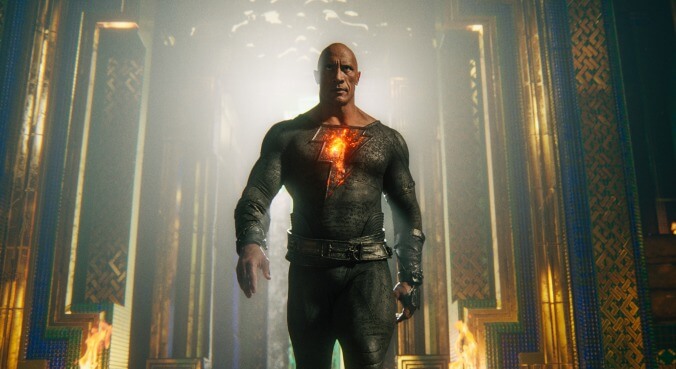Black Adam has a few bright spots, and a whole lot of punching
Dwayne Johnson's overdue superhero epic, while bolstered by smart turns from Pierce Brosnan and Aldis Hodge, could have been called One Long Fight: The Movie

For a movie Dwayne Johnson vigorously hyped as the catalyst for change in the “hierarchy of the DCU,” Black Adam unfortunately resembles large chunks of what came before: A brooding, weightless CG punch-a-thon, shot with the same grimy visual style of previous Snyderverse entries in the DCEU. A movie full of under-cranked, slow-mo action (it’s really okay to let this aesthetic go, Warner Bros.) and over-plotted world-building that delivers more information than emotion because the movie struggles to ground this world on the backs of characters worth emotionally investing in.
Before getting to the characters that we do care about (at least enough to distinguish them during one of the movie’s many repetitive, but occasionally inventive, slugfests), Black Adam drops audiences into this rich world with a lengthy live-action studio note, er, prologue that sets up the ancient history of Teth Adam’s homeland, a fictional country known as Khandaq. It is home to an all-powerful substance called Eternium, that the country’s evil ruler wants and he doesn’t care how his slaves get it. Young Teth Adam responds to such greed and cruelty by pulling a Spartacus and defeating the king, with the help of powers endowed upon him by the same wizards who gave Billy Batson his enhanced abilities in 2019’s Shazam!
Unlike Billy, Adam’s powers are fueled seemingly by revenge, which leads to Adam being imprisoned for 5,000 years by the very wizards who granted him such abilities. He is awakened centuries later by Adrianna (Sarah Shahi), when she and her colleagues go Tomb Raider-ing in Khandaq for a powerful crown made out of Eternium. This crown, if in the wrong hands, can be used to help summon literal Hell on earth—which is exactly what eventually happens. With the crown in the wind, Black Adam struggles to adjust to a non-kill ethos when confronted by the Justice Society of America, who have been dispatched by Viola Davis’ Amanda Waller to contain him (and provide some clunky interconnectivity across DC’s disjointed live-action films). From there, Black Adam churns out one confidently executed piece of pre-viz action after another—as the JSA battle Adam’s seemingly unchangeable ways before teaming up to stop a literal (if somewhat low-stakes) apocalypse.
What the movie and journeyman director Jaume Collet-Serra (The Shallows) can’t stop is just how inconsequential this overstuffed, undercooked blockbuster feels. Johnson and his trademark charisma, which could power the lightning that his character wields, is often at odds with Adam’s significantly dialed down, almost dour characterization. The filmmakers seemingly try to go the T2 route with the anti-hero, giving him an arc similar to Arnold’s T-800 in terms of both having to learn to appreciate the value of human life despite possessing abilities that can quickly extinguish it. Black Adam even pairs Adam with a young boy (played by Bodhi Sabongui), who, like Edward Furlong’s John Connor before him, acts as the big guy’s snarky, clever guide to this new world.
While this relationship provides the movie with some of its few genuine heartfelt moments, it gets somewhat shortchanged by all the sulking and repetitive “murder is bad” arguments Adam finds himself in. Even though it’s revealed that the character’s default scowl is well earned, given the trauma of his distant past, this creative choice comes at the cost of putting Johnson in arguably his hardest to like role. Fans and audiences may want to see him in a superhero movie, but do they really want to see him in this one? At least Johnson’s Adam finally gives us a comic book character who takes advantage of his flight abilities by mostly floating to wherever he must go.
Thankfully, Aldis Hodge’s Hawkman and Pierce Brosnan’s Doctor Fate invest their characters with more than enough personality to keep audiences entertained when the eponymous character falters. Hodge and Brosnan are given some of the movie’s funniest dialogue, as well as its most effective dramatic scene near the climax. They, alongside fellow JSA members Atom Smasher (Noah Centineo) and Cyclone (Quintessa Swindell), prove to be a charming and interesting team-up, worthy of their own movie instead of being, at times, awkwardly shoehorned into this one. (The JSA are sadly dealt a crappy hand when, after spending most of the movie speechifying about the negative toll destruction can have on a potential savior’s soul, they essentially “peace out” of the movie after kick-punching holes through an entire country. And with not even a look back to consider, “Hey, maybe we should help these people rebuild or at least relocate?”) The JSA sections of the movie are where Collet-Serra seems to be most engaged, even when he and his visual effects team have these DC heroes leave Hawkman’s estate in a manor similar to Marvel’s X-Men.
There’s a good movie, at times, a really good movie, hiding out in all the soulless clutter of Black Adam’s plot. Unfortunately, all the considerable talents here struggle to deliver it. Black Adam is a movie that would have you believe that the aforementioned country’s population would chant “champion” at the guy who helped demolish most of their homes and buildings. It is a movie where such in-world story logic concerns like that take up more of your investment than most of the characters and spectacle do. If there is to be more Black Adam in the DC Universe’s future (as a key mid-credits scene implies), then here’s hoping that both the character and the actor playing him get a story worthy of their considerable strengths.